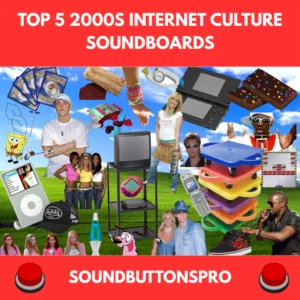Before TikTok trends and Discord memes, there was a simpler time – pixelated Flash games, MSN Messenger pings, and grainy YouTube clips that took minutes to load. The 2000s internet was wild, weird, and wonderfully unpredictable. And at the heart of that era was sound – bizarre songs, distorted voices, and iconic one-liners that spread through forums and chain emails. These were the sounds that built early meme culture, long before the word “meme” became mainstream.

Today, SoundButtonsPro.net keeps that golden era alive through nostalgic soundboards that bring us back to the days of dial-up humor and Flash animation glory. Here are five unforgettable soundboards that defined 2000s internet culture – the sounds that made the web feel like a playground.
Trololo Soundboard – The Laugh Heard Around the World
The Trololo Soundboard captures the pure absurdity of early viral content. In 2009, the rediscovery of Eduard Khil’s 1976 performance – a wordless, joyful baritone song – became an internet sensation. His uncontainable smile, coupled with that rolling “tro-lo-lo-lo-lo” melody, embodied everything strange and wholesome about the early meme age.
Forums and YouTube comments turned the clip into a global inside joke, and soon, the sound appeared everywhere – ringtones, remix videos, even Twitch alerts. On SoundButtonsPro.net, the Trololo board celebrates the meme’s universal language: laughter that needs no translation. It was proof that the internet didn’t need words to connect the world – just a joyful noise and a looping smile.
Leeroy Jenkins Soundboard – The Birth of the Meme Hero
In 2005, a World of Warcraft raid went terribly – and hilariously – wrong. A player named Leeroy Jenkins ignored his team’s careful strategy, charging headfirst into battle while shouting his now-immortal line: “LEEEEROOOOY JENKINS!”. Chaos ensued. So did internet immortality.
The Leeroy Jenkins Soundboard encapsulates that moment of reckless energy – the call that launched a thousand memes. It spread from gaming forums to mainstream TV, referenced in Jeopardy!, Family Guy, and even NASA communications. Today, streamers still use Leeroy’s voice for comedic timing, sudden chaos, or triumphant fails. On SoundButtonsPro.net, the clip remains a battle cry for every gamer who acts first and thinks later.
Badger Badger Soundboard – The Loop That Hypnotized a Generation
If you spent any time online in the early 2000s, you probably heard it: “Badger, badger, badger, badger, mushroom, mushroom!” The Badger Badger Soundboard was born from a looping Flash animation created by Jonti Picking (Weebl) in 2003. It was surreal, repetitive, and utterly addictive – the perfect encapsulation of internet weirdness.
The song’s nonsensical chant made it the prototype for future viral earworms like “Nyan Cat” and “Peanut Butter Jelly Time.” It wasn’t just funny – it was formative. The looping rhythm and visual absurdity showed that online humor could live in sound as much as sight. Two decades later, the Badger Soundboard on SoundButtonsPro.net remains a time capsule for anyone who remembers laughing at nonsense before irony was cool.
All Your Base Are Belong to Us – The First True Internet Catchphrase
Before memes were memes, there was “All your base are belong to us.” The phrase came from a mistranslated line in the 1989 video game *Zero Wing*, but it exploded online in the early 2000s through Flash videos and forum threads. The robotic voice, glitchy soundtrack, and janky visuals made it an instant cult classic.
The All Your Base Soundboard keeps that robotic charm alive. Each clip – from “You have no chance to survive make your time” to the titular phrase – recalls the early spirit of remix culture, where imperfections became art. Fans even projected the phrase on real buildings as an act of meme devotion. On SoundButtonsPro.net, it’s a reminder of the internet’s chaotic innocence – when bad grammar and good humor ruled the web.
Rickroll Soundboard – The Meme That Refuses to Die
No list of 2000s internet sounds is complete without Rick Astley’s “Never Gonna Give You Up.” What began as a simple bait-and-switch prank – the Rickroll – evolved into one of the most enduring memes ever made. It’s the sound of surprise, nostalgia, and collective laughter rolled into one synth-fueled chorus.
The Rickroll Soundboard lets you relive that first betrayal – or perform your own. It includes snippets of the iconic intro, the line “Never gonna give you up,” and crowd-chant remixes that reflect its endless rebirth through the years. Whether on Twitch or TikTok, Rick’s cheerful promise continues to unite generations of internet pranksters. On SoundButtonsPro.net, you’ll find versions remixed with everything from Doom OST to classical piano – proof that the meme never ages, it just evolves.
The Soundtrack of a Simpler Internet
What these soundboards share isn’t just nostalgia – it’s creativity born from limitation. Before HD streaming and AI tools, memes spread through shared discovery and simple joy. People didn’t overanalyze; they listened, laughed, and looped. The early 2000s were a digital frontier, where sound wasn’t background – it was the experience itself.
Today, revisiting these clips on SoundButtonsPro.net is like opening a time capsule. You can hear the early language of the web – joyful absurdity, imperfect voices, and community-driven laughter. These soundboards didn’t just define the 2000s; they defined what it meant to be online.
Conclusion: The Echoes That Built the Internet
The sounds of the 2000s weren’t polished or optimized – they were human. They captured the chaos, humor, and innocence of an internet still learning what it could be. From “Trololo” to “Rickroll,” these soundboards remind us that before algorithms and trends, the web was just a global room full of people laughing together at the same ridiculous sound.
And if you close your eyes and play those clips again on SoundButtonsPro.net, you’ll hear it: the heartbeat of a simpler, louder, happier internet.
